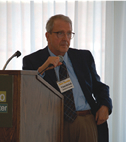|
EDUCATIONAL
POLICY & LEADERSHIP STUDIES
Pascarella-Led Study Finds Not All Liberal Arts Educations Equal

Professor Ernest Pascarella |
Many people extol the virtues of a good, solid liberal arts education, but what specific, measurable benefits do such an education actually impart upon students?
Professor Ernest Pascarella, the Mary Louise Petersen Chair in Higher Education, and colleagues seek to answer that and related questions in a new, refereed monograph titled “ Liberal Arts Colleges and Liberal Arts Education: New Evidence on Impacts.”
Among the monograph’s findings: Alumni who attended a liberal arts college were more satisfied than counterparts at public regional universities with their undergraduate education experience. They also reported that their experience had a significantly stronger impact on their learning and intellectual development, development of leadership and self-efficacy skills, personal and spiritual development, and development of responsible citizenship.
Liberal arts graduates also had higher levels of graduate degree attainment, were more likely to be employed in a nonprofit organization, were more involved in religious activities, donated a larger percentage of income to charity, took more continuing education courses, and reported lower levels of alcohol consumption.
At the same time, liberal arts college alumni were less likely to be employed full time, had lower annual salaries, and were less likely to vote in national elections and campaign for a political candidate.
Pascarella said the variations stem in part from inconsistencies among liberal arts colleges in how they view and carry out their missions. Not all, for instance, demonstrate the same level of commitment to effective teaching practices, set high expectations for students, ensure frequent and fruitful student-faculty contacts, offer integrated intellectual experiences, or present sufficient opportunities for involvement in extracurricular activities—historically hallmarks of a true liberal arts education.
“Basically, liberal arts colleges came out looking good,” Pascarella said. “It’s just that they don’t necessarily have all the overwhelming effects on students’ lives that people say they do.”
Conversely, some other kinds of institutions like public, regional schools, can offer as good an education or better if they adhere to good liberal arts practices.
Pascarella’s coauthors are Gregory C. Wolniak (PhD ’04); Tricia Seifert, a doctoral student in the Student Affairs Administration and Research Program; Ty M. Cruce (MA ‘02/PhD ’04); and Charles F. Blaich.
The study involved longitudinal datasets on 6,500 students and alumni at more than 40 institutions.
“We found that liberal arts colleges do foster good practice,” Pascarella added. “But the single biggest finding was that an institution’s liberal arts emphasis—rather than the institution type—was what counted the most.”
Leadership Matters
 Keynote speaker Dr. Thomas Sergiovanni
Keynote speaker Dr. Thomas Sergiovanni |
Schools and school leaders are increasingly being held accountable for the achievement of all students.
“Leadership plays a key role in creating and sustaining schools that help all students achieve high standards,” said Clinical Associate Professor Susan Lagos Lavenz. “Because children matter, leadership matters, and better-prepared school leaders are essential.”
Realizing the difficulties educational leaders face, Lagos Lavenz and the Educational Administration program took the lead and orchestrated an Educational Leadership summer symposium to facilitate discussion and exchange of ideas, create awareness of the resources and leadership preparation programs available at Iowa , and solicit feedback and thoughts from practitioners to guide future curriculum offerings.
“Building effective educational leaders means using effort to elicit effort from others, and every member of the education community plays a significant role in this endeavor,” Lagos said.
Approximately 100 regional educators and administrators attended the symposium, supported by the Carver Trust, including seven superintendents, 35 school principals, nine directors, and 19 teachers. Participants praised the “thought-provoking, motivating event,” and overwhelmingly requested the symposium become an annual event.
Program highlights included Dr. Thomas Sergiovanni’s keynote lecture on leadership style and substance; Iowa Testing Program’s director, Dr. Stephen Dunbar’s presentation on assessment in an era of standards-based reform; and discussion panels focusing on issues such as working in isolation, managing never-ending workloads, professional development, and first weeks of school.
|